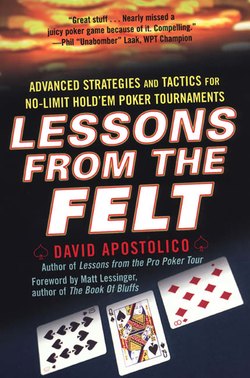Читать книгу Lessons From The Felt: Advanced Strategies And Tactics For No-limit Hold'em Tournaments - David Apostolico - Страница 9
На сайте Литреса книга снята с продажи.
Introduction
ОглавлениеThis book started out as a follow-up to my previous book Lessons from the Pro Poker Tour. Lessons from the Pro Poker Tour was largely dedicated to hand analysis from select events played on the Professional Poker Tour®—the first series of tournaments limited to the top professionals in the world. I was fortunate enough to gain an exemption into a couple of the events and both played in and witnessed a number of tremendous nuanced plays that could make or break tournaments but did not necessarily make for great television. This book was originally envisioned as primarily a hand-analysis book composed of hands played at every level of Texas Hold’em tournaments. It became much more than hand analysis, although lessons were still taken from tournaments at every level, as well as additional sources.
Poker is a game of never-ending learning. No matter how much you play, you can still learn a great deal from reading and discussing. So many unique hands and situations are available in poker, and being exposed to as many as possible will help you when you find yourself in a new situation on the felt. More important, though, is learning how to think critically about what is going on at the table so that you can develop your own style of play that will prove most profitable for you.
Being a corporate lawyer for close to twenty years, I have been trained to think critically on a daily basis. When I graduated from law school back in 1988, I went to work as an associate at a Wall Street law firm specializing in mergers and acquisitions. The first week on the job, all the new associates went through a rigorous and extensive training. What I remember most is one senior partner’s speech. He told us frankly that our work had to be perfect. Our clients were paying for, and expected, nothing less. We had to dedicate ourselves to that goal no matter what the task. If that meant skipping a few meals, then you skip a few meals. If that meant going without sleep for a couple of nights, then so be it. I would soon find out that he was not exaggerating. There were plenty of all nighters during my time there. We literally made sure every i was dotted and t was crossed—often working for over forty-eight straight hours.
I wish poker were that easy. As anyone who has played the game can contest, you cannot perfect poker. The goal should be the same, though: to play as perfectly as possible. By setting your goal in such a way, you will minimize your mistakes (although you will still make plenty) and maximize your profits on the way to becoming a winning player. To reach that end, always concentrate on the process and not the results. There is a lot of luck in poker, and you cannot be overly encouraged or discouraged by short-term wins and losses. Instead, take a critical look at your play to make sure you are striving for perfection.
So what is this book about? As I was writing this book, my game was going through a transformation. I had been playing so much that I had started to play by rote and was becoming too mechanical. Because poker is a game of imperfect information, you can never play perfectly. As a goal-oriented person, it is difficult to strive for an unattainable goal. Yet, to be the best player I can be, I still must have the attitude that I am going to do everything in my power to reach perfection.
In my quest for knowledge, this book took on a new direction. It became a potpourri of poker principles (and even some nonpoker principles) that have improved my game, and will, I hope, improve yours. I found myself learning in ways and in places I could not have imagined before—from low-stakes games with novices to game shows on television. I was training myself to look critically at many different situations both inside and outside of poker.
Rest assured, this book still contains a lot of poker and even some hand analysis that's sure to improve your game. More important, I hope that the reader will walk away with the ability to learn to think critically, with an increased awareness of what’s going on at the poker table, and with the desire to take that extra step and think seriously about events outside the poker arena and the way they can be applied to poker. (Note: While poker is a gender-neutral game, for simplicity’s sake, I have used the masculine third person where I could have just as easily used the feminine. It is meant to be neutral.)
